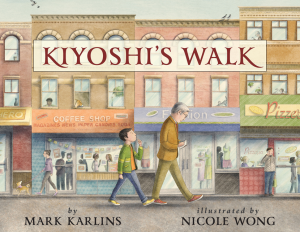Reviewed by Pat Corekin
Review Source: Teaching for Change
Book Author: Mark Karlins
“Where do poems come from?” young Kiyoshi asks his grandfather, Eto, and so begins a wonderful journey of poetic discovery. Eto takes Kiyoshi for a walk through their city. The smallest events — a cat knocking over oranges at the corner store, birds soaring in open skies, a stuffed bear left alone in an abandoned house — all give Eto ideas for new haikus.
This awakens in Kiyoshi the desire to write his own poem. He now understands where poems come from and, feeling a bit lonely as the sun sets and the park empties, he finds the words to connect his world to his heart, the way his grandfather showed him.
Kiyoshi’s Walk touches quietly on themes of loneliness and loss and provides a way to understand the world by seeing the poetry all around us. This, along with reaching out to hold the hand of a beloved grandparent, gives Kiyoshi (and the reader) a feeling of reassurance.
Illustrations with soft and inviting earth tones draw the reader into aspects of nature, whether in the busy city street or in the park. It’s hard not to see — and feel — poetry everywhere, if only we look for it.
Pat Corekin is a Social Justice Books publications specialist at Teaching for Change.


Kiyoshi's Walk by Mark Karlins
on March 9, 2021
Genres: Asian American, Poetry
Pages: 32
Reading Level: Grade K, Grades 1-2
ISBN: 9781620149584
Review Source: Teaching for Change
Publisher's Synopsis: Where do poems come from? This beautiful picture book about a young aspiring poet and his grandfather shows that the answer lies all around us — if we take the time to look.
After Kiyoshi watches his grandfather, Eto, compose his delicate haiku, he wonders out loud: Where do poems come from? His grandfather answers by taking him on a walk through their city, where they see a cat perched on a hill of oranges; hear the fluttering of wings; imagine what's behind a tall wall; and discuss their walk, with each incident inspiring a wonderful new haiku from Eto. As Kiyoshi discovers that poems come from the way the world outside of us meets the world within each of us, he also finds the courage to write a haiku of his own.
This lovely book will speak to any reader who treasures poetry, city life, grandparents, or the beauty of the everyday.

Leave a Reply